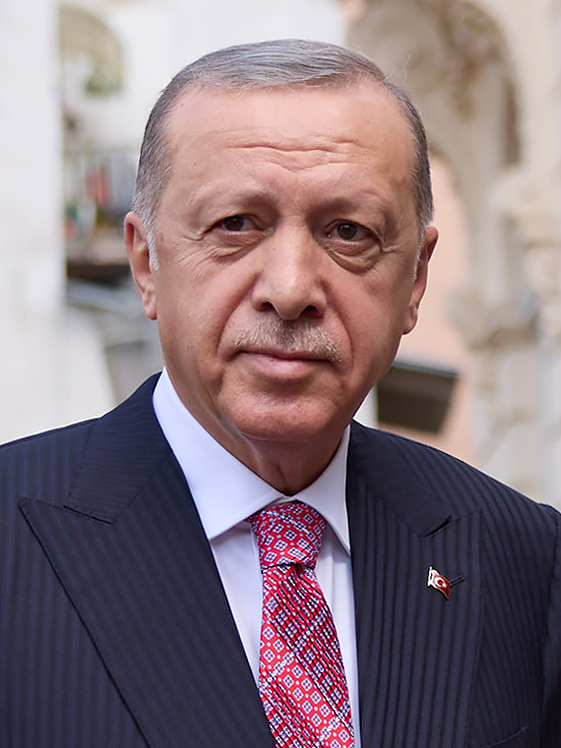
Recep Tayyip Erdoğan
Recep Tayyip Erdoğan[b] (born 26 February 1954) is a Turkish politician who is the 12th and current president of Turkey. He previously served as prime minister from 2003 to 2014 as part of the Justice and Development Party (AKP), which he co-founded in 2001. He also served as mayor of Istanbul from 1994 to 1998.
"Erdoğan" redirects here. For the name, see Erdoğan (name).
Recep Tayyip Erdoğan
- Fuat Oktay
(2018–2023) - Cevdet Yılmaz
(2023–present)
- Ahmet Necdet Sezer
- Abdullah Gül
Abdullah Gül
Ahmet Davutoğlu
Binali Yıldırım
Position established
Ahmet Davutoğlu
26 February 1954
Beyoğlu, Istanbul, Turkey
Justice and Development (2001–2014; 2017–present)
- National Salvation Party (before 1981)
- Welfare Party (1983–1998)
- Virtue Party (1998–2001)
(sons-in-law)
Erdoğan was born in Beyoğlu, Istanbul, and studied at the Aksaray Academy of Economic and Commercial Sciences, before working as a consultant and senior manager in the private sector. Becoming active in local politics, he was elected Welfare Party's Beyoğlu district chair in 1984 and Istanbul chair in 1985. Following the 1994 local elections, Erdoğan was elected mayor of Istanbul. In 1998 he was convicted for inciting religious hatred and banned from politics after reciting a poem by Ziya Gökalp that compared mosques to barracks and the faithful to an army. Erdoğan was released from prison in 1999 and formed the AKP, abandoning openly Islamist policies.
Erdoğan led the AKP to a landslide victory in the election for the Grand National Assembly in 2002, and became prime minister after winning a by-election in Siirt in 2003. Erdoğan led the AKP to two more election victories in 2007 and 2011. His tenure consisted of economic recovery from the economic crisis of 2001, the start of EU membership negotiations, and the reduction of military influence on politics. In late 2012, his government began peace negotiations with the Kurdistan Workers Party (PKK) to end the Kurdish–Turkish conflict, negotiations which ended three years later.
In 2014, Erdoğan became the country's first directly elected president. Erdoğan's presidency has been marked by democratic backsliding and a shift towards a more authoritarian style of government. Notably events of his presidency include the 2013 Gezi Park protests, the 2016 failed coup attempt, his economic policies have led to high inflation rates and the depreciation of the value of the Turkish lira, and he has overseen ongoing conflict in Syria. He also oversaw the transformation of Turkey's parliamentary system into a presidential system, introducing term limits and expanding executive powers. He has also expanded Turkey's role into becoming the world's largest refugee host, and launched operations against the Islamic State, Syrian Democratic Forces and Assad's forces. He responded to the 2022 Russian invasion of Ukraine by closing the Bosphorus to Russian naval reinforcements, brokering a deal between Russia and Ukraine regarding the export of grain, and mediating a prisoner exchange.[4]
